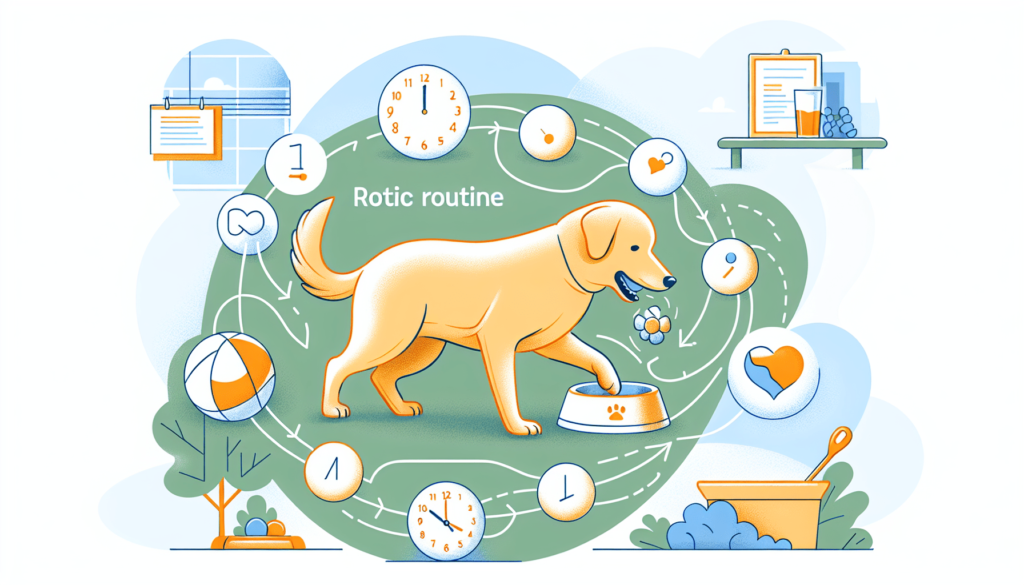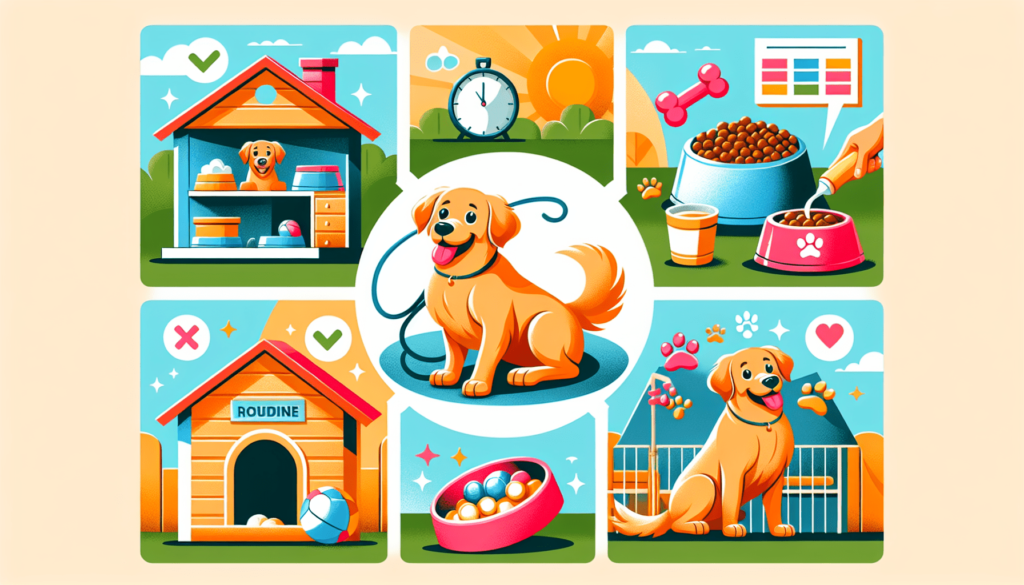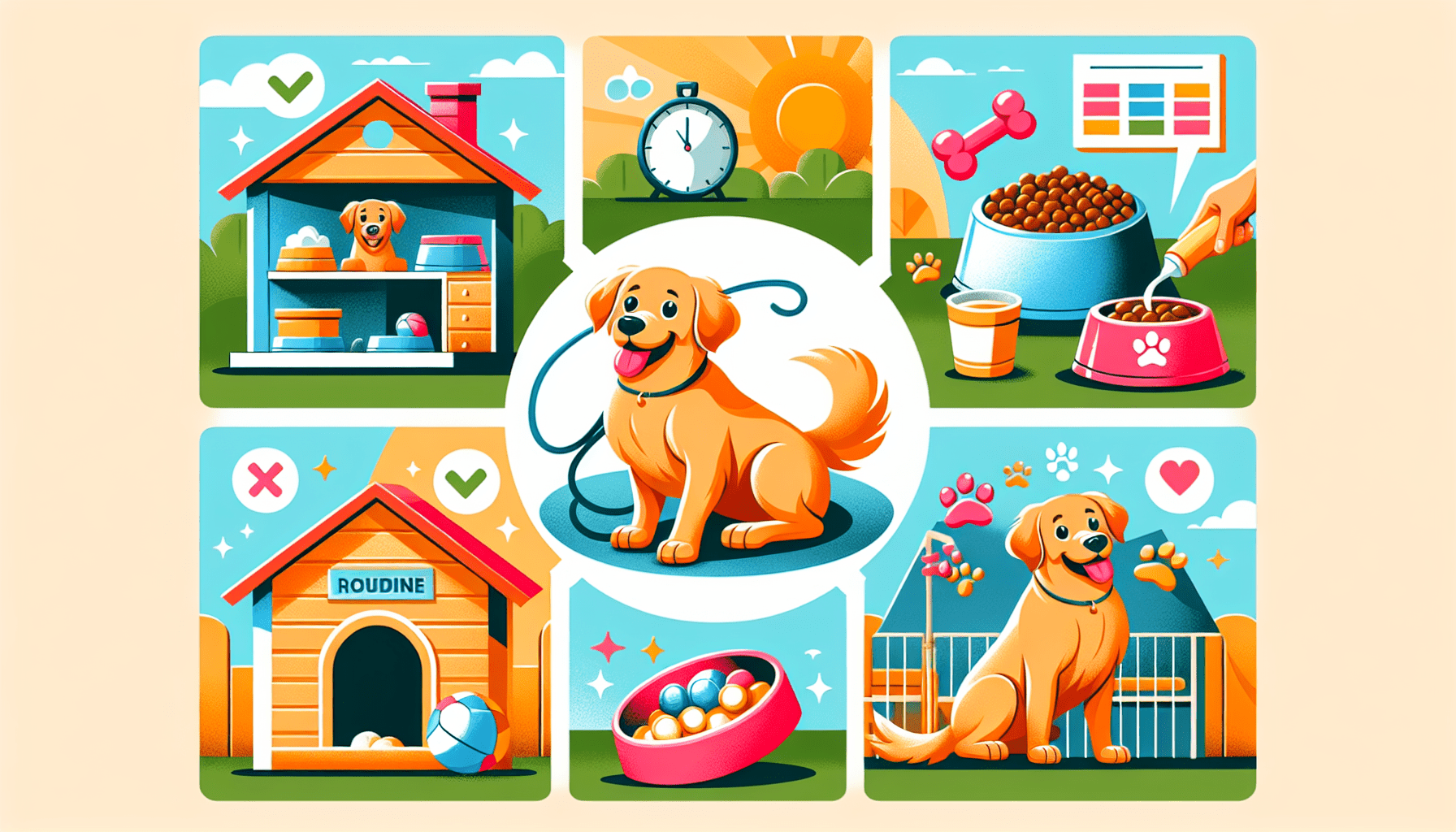Imagine a world without routines – it would be chaotic and overwhelming, right? Well, the same goes for our furry friends, particularly dogs. You may not realize it, but establishing a routine for your canine companion is crucial for their overall well-being and happiness. From a regular feeding schedule to consistent exercise and playtime, routines provide dogs with a sense of security and structure. In this article, we will explore the significance of routine in a dog’s life, highlighting its benefits for their mental and physical health. So, let’s dive into the importance of routine and how it can positively impact your four-legged buddy’s life!
Health Benefits of Routine
Routine plays a crucial role in maintaining a dog’s physical, mental, and social health. By implementing a consistent schedule and structure in their daily life, you can significantly improve their overall well-being.
Physical Health
Establishing a routine for feeding, exercise, and toilet training promotes good physical health in your furry friend. A regular feeding schedule helps regulate their metabolism and digestive system, preventing issues such as obesity or gastrointestinal problems. Similarly, incorporating a daily exercise routine ensures that they receive the necessary physical activity, preventing weight gain and promoting muscle strength and cardiovascular health. Additionally, a routine for toilet training helps maintain bladder and bowel regularity.
Mental Health
Just like humans, dogs thrive on mental stimulation. Incorporating mental exercises and enrichment activities into their routine can keep their minds engaged and active, preventing boredom and the development of destructive behaviors. Mental stimulation can include interactive toys, puzzle feeders, or training sessions. By providing mental challenges, you can improve their cognitive function, promote problem-solving skills, and enhance their overall mental well-being.
Social Health
Dogs are social creatures that crave companionship and interaction. Routine can positively impact their social health by providing consistent opportunities for socialization. This can involve regular playdates with other dogs, visits to the dog park, or attending training classes. Regular social interactions help dogs build their social skills, boost their confidence, and decrease any tendencies towards aggression or fearfulness.
Establishing a Daily Routine
Creating a daily routine for your dog helps provide structure and predictability, which they thrive on. Here are several key elements to include when establishing their routine.
Feeding Schedule
Establishing a regular feeding schedule is essential for maintaining their physical health. The timing of meals should be consistent, allowing for a steady metabolism and preventing unnecessary weight gain. Consult with your veterinarian to determine the appropriate amount of food and the frequency of feeding based on your dog’s age, breed, and activity level.
Exercise Routine
Daily exercise is vital for a dog’s physical and mental health. Incorporate regular exercise sessions into their routine, ensuring they receive the appropriate amount of physical activity to keep them fit and happy. The duration and intensity of exercise can vary based on your dog’s age, breed, and overall health. Activities can include walks, runs, play sessions, or even agility training.
Toilet Training
Housebreaking your dog is a fundamental aspect of their routine. Establish consistent bathroom breaks throughout the day, particularly after meals and waking up from sleep. Use positive reinforcement methods to encourage appropriate elimination behavior, rewarding them when they successfully go outside. Consistency and patience are key in toilet training, so be prepared to invest time and effort into this process.
Playtime
Incorporating structured playtime into your dog’s routine is essential for their physical and mental well-being. Engage in interactive play sessions with toys or games that stimulate their natural instincts and provide them with an outlet for their energy. This can include games of fetch, tug-of-war, or hide-and-seek. Playtime also strengthens the bond between you and your dog, creating a positive and enjoyable experience for both of you.
Mental Stimulation
To keep your dog’s brain active and engaged, make sure to include mental stimulation activities in their routine. This can involve obedience training sessions, puzzle toys, or scent games. By providing these mental challenges, you can prevent boredom and promote mental agility and problem-solving skills in your dog.

Reducing Anxiety and Stress
Having a routine in place contributes to reducing anxiety and stress in your furry companion. Dogs thrive on a sense of security and predictability, and a well-established routine provides just that. Here’s how routine helps in anxiety and stress reduction.
Sense of Security
Dogs are creatures of habit and thrive when they have a predictable daily routine. A consistent schedule provides them with a sense of security and assurance, creating a stable environment in which they can feel safe and comfortable. Knowing what to expect reduces their anxiety levels and helps them navigate through their day with confidence.
Predictability
By following a routine, you establish a predictable pattern of events that your dog can anticipate and rely on. This predictability is crucial in reducing anxiety, as your dog will know what to expect and can prepare mentally for various activities, such as meals, walks, or playtime.
Coping Mechanisms
A routine helps dogs develop coping mechanisms to deal with stressful situations. When exposed to occasional disruptions or changes in their environment, dogs with an established routine are better equipped to handle and adapt to these changes. The predictability and structure provided by the routine act as a grounding mechanism, allowing them to navigate challenging situations with greater ease and resilience.
Behavioral Benefits
Routine plays a significant role in shaping your dog’s behavior, mitigating destructive behaviors, reducing aggression, and improving training efforts.
Preventing Destructive Behavior
Having a consistent routine provides dogs with a sense of purpose and gives them an outlet for their energy. By incorporating regular exercise sessions, playtime, and mental stimulation into their daily routine, you can help prevent destructive behaviors such as excessive chewing, digging, or barking that often result from boredom or pent-up energy.
Reducing Aggression
A well-established routine can help reduce aggression in dogs. Predictability and structure reduce stress and anxiety levels, which are often triggers for aggressive behaviors. By providing a consistent routine that includes socialization opportunities and structured training sessions, you can help your dog develop appropriate social skills and manage their behavior more effectively.
Improving Training
Routine plays a crucial role in dog training. Consistency is key when teaching your dog basic commands and desired behaviors. By incorporating training sessions into their daily routine, you provide them with regular opportunities to reinforce their training and solidify their learning. The repetition and consistency of a routine help dogs understand and remember what is expected of them, leading to improved training outcomes.

Improved Bonding
Establishing and maintaining a routine in your dog’s life greatly enhances your bond and strengthens your relationship. A routine promotes trust, communication, and quality time together.
Trust and Confidence
By providing a consistent routine, you build trust and confidence in your dog. They learn to rely on you to meet their needs and anticipate their wants. This trust forms the foundation of a strong bond between you and your furry friend.
Clear Communication
Routine allows for clear and effective communication between you and your dog. Through consistent training sessions and daily routines, you establish a common language and understanding. Your dog learns to recognize cues, commands, and your expectations, facilitating smooth communication and enhancing your ability to work together as a team.
Quality Time
Incorporating regular playtime, training sessions, and leisurely activities in your routine ensures that you spend quality time with your dog. These moments of shared enjoyment and interaction strengthen your bond and build a deeper sense of companionship. Quality time together also allows for mutual relaxation and promotes feelings of happiness and contentment for both you and your dog.
Promoting Good Sleep
Ensuring that your dog gets sufficient and quality sleep is essential for their overall well-being. A consistent routine can greatly contribute to promoting good sleep habits.
Sleep-Wake Cycle
Dogs, like humans, thrive on a regular sleep-wake cycle. Establishing a routine that includes specific times for waking up and going to bed helps regulate their internal clock. This allows them to develop a natural sleep pattern that aligns with your household’s routine.
Consistent Bedtime Routine
Creating a consistent bedtime routine prepares your dog for sleep and signals that it is time to wind down. Incorporate calming activities such as a short walk, quiet play, or snuggle time before bedtime. Providing a comfortable and cozy sleeping area with a familiar bed or blanket further promotes a sense of security and relaxation.
Bedding and Sleeping Area
Your dog’s sleeping area should be comfortable, clean, and conducive to quality sleep. Ensure that their bed or sleeping spot is in a quiet and secure location, away from loud noises or disturbances. Additionally, regularly washing the bedding and keeping the sleeping area tidy contributes to a healthy sleep environment for your furry friend.
Better Health Monitoring
Routine enables you to effectively monitor your dog’s health by observing their appetite, bathroom habits, and behavioral changes. It allows you to detect potential issues early on and seek timely veterinary care.
Observing Appetite
Establishing regular mealtimes as part of your dog’s routine helps you monitor their appetite. Significant changes in appetite, such as sudden loss of interest in food or increased hunger, can be an indication of underlying health problems. By consistently noting their eating habits, you can better detect any changes or abnormalities and consult with your veterinarian if necessary.
Monitoring Bathroom Habits
A routine that includes consistent bathroom breaks enables you to monitor your dog’s bathroom habits effectively. Pay attention to any changes in frequency, consistency, or color of their urine or stool. These variations may indicate digestive issues, dietary changes, or potential health concerns. By staying observant, you can address any problems promptly and help maintain your dog’s overall health.
Noticing Behavioral Changes
A well-established routine allows you to recognize behavioral changes in your dog more readily. Dogs can sometimes exhibit subtle changes in behavior when they are unwell or experiencing discomfort. By closely monitoring their behavior as part of your routine, you can detect any unusual or concerning changes, such as increased lethargy, irritability, or restlessness, that may indicate an underlying health issue.
Transitioning During Key Life Events
Life events such as introducing new family members, moving to a new home, or changes in routine or schedule can be challenging for dogs. However, a well-established routine can assist in smoothing the transition and helping your dog adjust more comfortably.
Introducing New Family Members
The arrival of a new baby or a new pet can disrupt the established routine in your household. Prioritize maintaining a consistent schedule for your dog during this period of adjustment. Gradually introduce your dog to the new family member, ensuring they receive individual attention and quality time. By including them in the routine and providing reassurance, you can help your dog feel secure in the midst of change.
Moving to a New Home
Moving to a new home can be stressful for dogs, with unfamiliar surroundings and changes to their daily routine. To ease the transition, maintain their routine as much as possible during the move. Set up their bedding and familiar items in the new space before their arrival to create a sense of familiarity. Gradually introduce them to the new home, room by room, allowing them time to explore and adjust.
Change in Routine or Schedule
Changes in routine or schedule, such as a new work schedule or a different household dynamic, can impact your dog’s routine. Dogs are adaptable, but they may initially struggle with sudden changes. Gradually introduce any adjustments to their routine, ensuring that their essential needs for exercise, meals, and attention are met consistently. Providing stability and predictability during periods of change helps your dog adjust and thrive.
Supporting Aging Dogs
As your dog ages, routine becomes even more important in maintaining their well-being and supporting their changing needs. Here’s how routine can benefit aging dogs.
Maintain Cognitive Function
Routine plays a significant role in maintaining cognitive function as dogs age. Consistent mental stimulation, including memory games, obedience training, and puzzle toys, helps keep their brain active and engaged. Incorporating these activities into their routine can slow cognitive decline, promote mental acuity, and support their overall cognitive health.
Minimize Disorientation
Older dogs may experience disorientation or confusion due to age-related changes. Establishing a consistent routine provides them with a sense of familiarity and security, minimizing any possible disorientation. A predictable schedule helps aging dogs navigate through their day with confidence, reducing anxiety and promoting their overall well-being.
Adaptation to Physical Changes
As dogs age, they often experience physical changes, such as decreased mobility or sensory impairments. A well-established routine takes these changes into account and allows for adjustments to accommodate their evolving needs. This may include shorter and more frequent walks, providing ramps or stairs for easier access, or modifying their feeding habits to accommodate dental issues or dietary restrictions.
Tips for Establishing and Maintaining Routine
To make the most of routine in your dog’s life, consider these helpful tips:
Consistency is Key
Consistency is crucial in establishing and maintaining routine. Stick to the same schedule as closely as possible, especially for essential activities such as feeding and exercise. Regularity ensures that your dog understands and can rely on their routine, leading to a sense of stability and security.
Start Early
The earlier you establish a routine for your dog, the easier it will be for them to adapt and thrive. Puppies, in particular, benefit greatly from a structured routine as they learn appropriate behaviors and develop good habits. Starting early sets a strong foundation for their future.
Gradual Adjustments
When making changes to your dog’s routine, such as adding or modifying activities, make adjustments gradually. Dogs thrive on predictability, and sudden disruptions to their schedule can cause stress and anxiety. Introduce any changes slowly, allowing them time to adjust and become comfortable with the new routine.
Flexibility Within Routine
While routine is essential, it is also important to maintain flexibility within that structure. Adapt the routine to accommodate life events, unexpected circumstances, or your dog’s individual needs. Recognize that some variations may be necessary from time to time and strive to strike a balance between routine and adaptability.
In conclusion, routine plays a vital role in a dog’s life, benefiting their physical, mental, and social health. By establishing a structured daily routine, you can promote their overall well-being, reduce anxiety and stress, shape their behavior, and strengthen your bond. Additionally, routine allows for better health monitoring, helps transitions during key life events, supports aging dogs, and provides a stable and predictable environment for your furry companion. With consistency, patience, and flexibility, you can create a routine that contributes to a happy, healthy, and thriving life for your beloved dog.

